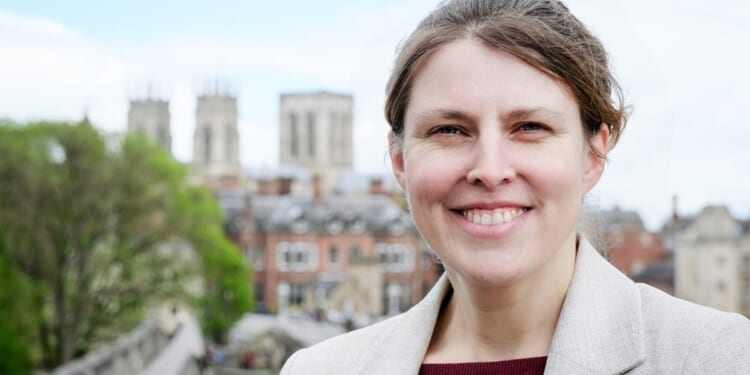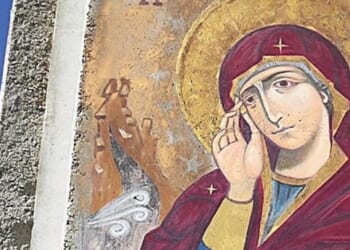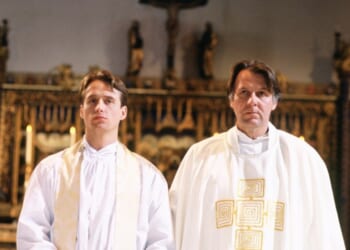IN THE summer of 2024, the Labour Party was riding high. But its member for York Central was not. Rachael Maskell had been an MP for nine long years of opposition, and finally her party had reclaimed power. And yet she had seen “everything stripped away”. She was not in the Cabinet, or a minister; she was not on any committees, and had no other responsibilities. “I realised after the 2024 election that I had literally nothing. And Westminster is built on having something.” And so she turned to God, and spent time in “prayer and surrender”.
Almost straight away, she was asked to join the campaign against her own government’s cuts to winter fuel payments. Ms Maskell did some research, consulted her constituents, and decided that she had not been elected “to make people poorer”. She spoke out. “And that’s really been the journey” ever since.
After that initial act of rebellion, Ms Maskell has become a regular thorn in the side of Sir Keir Starmer’s Government, including leading the ultimately successful resistance earlier this year to another raft of welfare cuts. Despite describing herself as “Labour to the core”, this last act of defiance led to the removal of the Labour whip. She now sits as an independent.
Having grown up in a strongly Labour-supporting and trade-unionist home, Ms Maskell says, her affiliation to the party runs deep. She insists that she did not set out to become a leading parliamentary rebel, but was “learning to just trust God on that journey, and to seek to serve him in all that I do”.
Her political awakening developed side by side with her faith. She was just 11 years old when she “came to a personal relationship with Christ”, she says. At about the same time, she remembers questioning her parents in depth about the political strife in the early Thatcher years, and began to see how the Christian narrative played into this.
“I absolutely recognised that there was a relationship between the social injustices of our time, and how the Church was such an answer to them; but also to see that people and politicians were making these decisions which were all about harm and misery, as opposed to freedom and delight.”
When, in her later teens, she came across the Christian Socialist Movement (today known as Christians on the Left), she thought: “Oh — this is the place where it all comes together.” Inspired by Mother Teresa, Ms Maskell embarked on a career in the NHS, but quickly found herself also rising up the ranks of her trade union.
Friends often urged her to run for Parliament, but she resisted, feeling that her calling was to stay focused on health campaigning. But, while working for the former Labour Health Secretary Andy Burnham, in the early 2010s, she moved to York. Within a few months, the sitting MP unexpectedly announced that he would be leaving Parliament. “Doors flew open,” she says, with the “opportunity to represent York and to be the MP”.
DOORS opening at unexpected times is also a theme in Rebecca Smith’s journey to Parliament. She grew up in Devon and was also in her teens when she developed an interest in both Christianity and politics. “I don’t think I would say it was a calling at that point. It was just an interest,” the Conservative MP for South West Devon recalls. But, then again, where did this interest arise? “I think it probably was God-given, even when I was 15.”
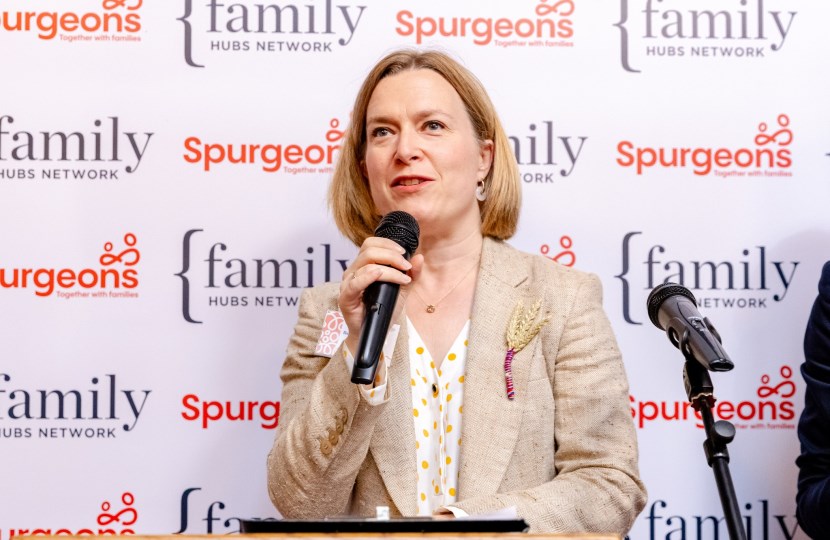 Rebecca Smith, Conservative MP for South West Devon
Rebecca Smith, Conservative MP for South West Devon
After university, she was keen to work in politics and applied for an internship, battling with hundreds of other applicants for a handful of positions. She remembers praying at the time, telling God that this was what she wanted to do and thought she would be good at, but trying to remain “very open-handed”: “God, you’ve got to open a door to me.”
Even after landing the internship, which took her to work in Brussels, she knew that her chances of making it into Parliament were slim. Her prayers remained: “If this is what you’ve called me to, God, you’re going to have to open all those doors.” For the past 30 years, she has been pushing doors and seeing where they take her, she says.
Initially, she understood her vocation to be to work in support of front-line politicians, and spent time in an MP’s office in Westminster before going on to work for a church. After a series of serendipitously well-timed, if unplanned, career moves, she landed back in Devon to fight her way first on to the local council, then the Conservative candidates’ list, and then to contest and lose the 2019 election, before finally securing her seat last year.
Throughout, Ms Smith says, she consistently sought guidance from God about whether this path was the right one. “All of that has been ‘God . . . is this still what you want me to do?’”
FOR the Liberal Democrat MP for Guildford, Zöe Franklin, it was what she calls (with affection) her “quarter-life crisis” which propelled her, she says, into the House of Commons.
In her mid-twenties, the lifelong Liberal Democrat was working in a dingy basement office in London, and becoming increasingly dissatisfied. She recalls reading the book God’s Politics, by the American Christian activist Jim Wallis, which attacks the theology of the religious Right while castigating the political Left for ignoring the social-justice foundations of Christianity. “I had this sense of ‘I want to do more, I want to save the world,’” Ms Franklin says.
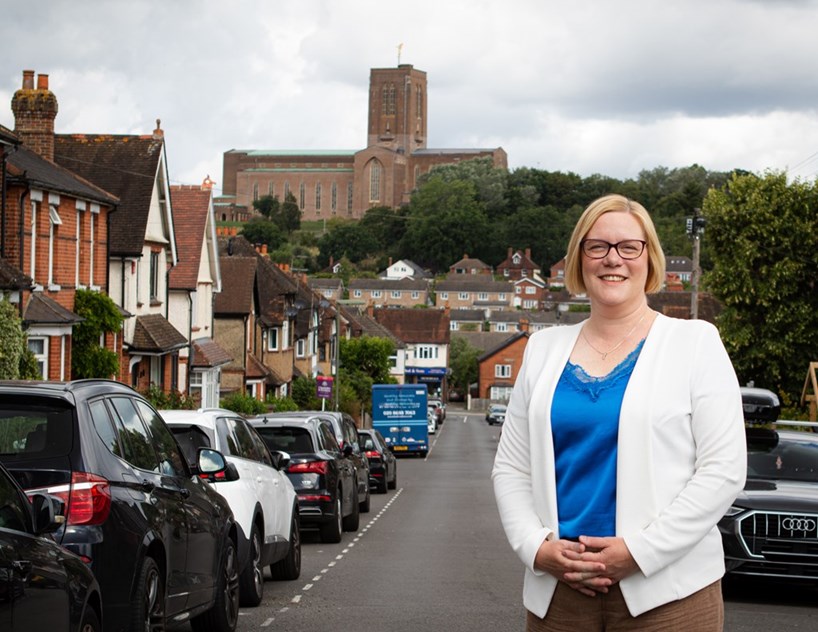 Zoë Franklin, Liberal Democrat MP for Guildford
Zoë Franklin, Liberal Democrat MP for Guildford
A temporary job at the Liberal Democrat Christian Forum popped up, which Ms Franklin took on with gusto. This led to her becoming a councillor in Guildford for seven years. It was only ever going to be the Liberal Democrats, given that she had first been drawn into the party at the age of 18, when she read the preamble to its constitution. “That sounds very dull, but it was great, because it set out what the values of the party were.
“I guess there was, in a sense, a calling to it. I only really realised after the time, but it is very much rooted in my faith, and wanting to help people, and that sense that we’re called to make the world a better place.”
In the aftermath of the Brexit referendum, as UK politics was turned on its head and an early election loomed, Ms Franklin decided to stand, and to offer what she had in national political life. “People knew who I was [as a councillor], but also I had this deep sense that I just wanted to be able to help my community even more, and help a community beyond the one I was already serving. And so I stepped through the door that appeared to be opening for me.”
ALL three MPs have experienced being questioned about how they could be both a Christian and a member of their party.
Ms Franklin says that it should be no surprise that the gospel cannot be contained in any one party, but finds legitimate expression across the spectrum. “I’m a great believer in the fact that actually there is not one single party that represents Christians; so it’s never really bothered me.” If there are a plethora of worship styles and churches, why wouldn’t there also be a variety of ways to see Christian values “intersect with the political world”, she asks.
She identifies considerable overlap between Christianity and Liberal Democrat values concerning inclusion, equality, and justice. “I look at my Bible, and I see that we are all equal in the sight of God. God loves us all. Again, I think the Bible is absolutely rooted in social justice: you see God’s heart for justice, and outcomes that benefit the poor.”
She also points to the internationalism of her party, which, she says, chimes well with her “outward-looking” Christianity. “It isn’t just about me in my little part of the world, a single country,” she says. “It’s about the whole world that God created, and we are all part of this. It shouldn’t be one people group, one expression of how you live your life, against each other.”
Ms Smith has also wearily endured people demanding to know how she can possibly be a churchgoing Conservative (despite that party’s historic reputation as the Church of England at prayer). She retorts that there is a long list of reasons that she finds her faith best expressed as a Conservative. Those common values could be summed up as: “Take responsibility for your own life, and look after the most vulnerable. You play by the rules, and then you look after those who can’t.”
SOMETIMES, however, Christian MPs feel the pull of Christ away from their party line. For most of her years in opposition, Ms Maskell kept a low profile and stayed loyal to her party bosses. She served on committees and held several positions in the Shadow Cabinet. But she was unafraid to vote according to her convictions, even when that cut across her colleagues: she was one of just five Labour MPs to oppose legalising abortion in Northern Ireland in 2019, and opposed this again in 2022. She also quit the front bench in 2021 to vote against mandatory Covid vaccinations for health-care workers.
And so, when she felt prompted to stand up against the Government’s welfare cuts, she did not hesitate. Indeed, dozens of her Labour colleagues joined her earlier this year to block efforts to slash Personal Independence Payments (PIP), forcing the Government into a U-turn (News, 25 July).
Ms Maskell says that she could not help but sense the hand of God in the defeat. “All I can say in that debate on the welfare cuts is that there was a real presence and heaviness, and that Bill unravelled in a way that I can’t describe as anything but meant to be.” She has no grand plan or strategy, but is simply trying to “learn obedience and to honour what is asked of me, and, ultimately, to turn the thanks to God for all that he is doing in our world”.
Her defiance has earned her opprobrium and censure from party bosses, but plaudits from some in the Church. She recalls a conversation with the Archbishop of York in the midst of her agonies over whether to fight more welfare cuts. “I said: ‘I’m just going to have to tough it up,’ and he said: ‘Keep your soft heart.’ And I think they were really wise, if not prophetic, words.”
At a time when political leaders seem to compete to see who can espouse the toughest and harshest rhetoric, Ms Maskell says, she feels compelled to pursue “kindness” instead. “I do think it’s really important to live with the fruit of the Spirit in all that I do. Of course, as I say, I fall and I falter, but I think that is a high ambition.”
BUT both Ms Smith and Ms Franklin feel a degree of frustration with the popular perception of their workplace — commonplace in some parts of the Church — as a cesspit of cruelty and immorality. The Liberal Democrat says that she has never felt the need either to hide her faith or to evangelise her colleagues. Instead, she focuses on acting with integrity and authenticity.
For Ms Maskell, holding to her Christian integrity has come at the cost of political advancement, she believes. But, she says, true political success comes not from climbing any greasy pole, but in transforming ordinary people’s lives.
“And, actually, when I look at what some of my colleagues do in government, how much power do they actually have? Is it really worth sacrificing your principles and your purpose in order to hold a position? I would encourage people to turn up and serve, to open your hands every day, and to seek God’s purpose.”
Full-fat faith needs not act as a barrier to promotion, Ms Smith believes. She says, however, that it is vital that believers do not adopt a holier-than-thou approach to politics, but instead be, in Jesus’s words, “wise as serpents, yet innocent as doves”. She seeks to hold on to her Christian “naïvety” in thinking the best of people, while still knowing how to “work the system”. “In my experience, it’s possible to be successful without having to treat people really badly,” she says.
The fact some Christians want nothing to do with what the former leader of her party Tim Farron jokingly calls the “mucky business” of politics troubles her. “It makes me feel sad, because I’ve seen the difference that political engagement and involvement can make to people’s lives.”
It would be a tragedy for parts of the Church to shut themselves off from Westminster, and lose any ability to influence policy, she says. “I would go so far as to say, God wants us to use all of the options we have on the table, to find solutions to the problems in this world.” All Christians should be involved in politics in some way, she says, whether that is as “small” as voting, all the way up to joining her in the Commons.
HER Conservative counterpart, Ms Smith, has also grown tired of the stereotypes. Politics is like any other profession: “You get people who work for charities who are completely corrupt, and then you get politicians who are not. I just think a lot of it is perception.”
MPs are just “normal people”, she insists. “We have families. We bake a cake for our mum’s birthday. We go home and have to be the big sister and get annoyed when our mum doesn’t cook enough roast potatoes. We’re still human.”
Indeed, if human beings have chosen to spend their time trying to make other people’s lives better, Ms Smith says, she cannot see how any churchgoer could object to such a vocation.
Ms Franklin returns to the Gospels to defend her “calling”. The story of Jesus cleansing the temple played an unexpected part in her religio-political awakening. She says that, in her early days, when she was living on a deprived estate in Guildford, a core motivation for her was anger at how her community was being failed.
“I drew a lot of inspiration from the story of Jesus in the temple, where he is clearly compassionate for the people who are being diddled. He is saddened, but he’s also really angry about the people who are behaving like this.”
To this day, that anger, tempered by compassion, drives her forwards when Westminster life gets her down, she says. Although anger is seen as a negative emotion, she is convinced that it is a “very biblically rooted reason for continuing”.
ALL three MPs say that their personal religious convictions cannot help but influence their voting record.
Ms Maskell says that none of her constituents would be in any doubt that she is a Christian. “Sometimes, they might think ‘Oh, she’s doing that Christian thing — I don’t quite get it.’” But whether she is voting on Gaza, child poverty, assisted dying, or abortion, she seeks to be consistent and to explain her decisions. Even if her non-believing constituents do not share her values or framing of any issue, they can at least understand where she is coming from.
Ms Smith says: “I became a Christian 40 years ago; so I actually don’t know what Rebecca Smith who wasn’t a Christian would look like.” And yet she tends not to launch into speeches with the phrase “As a Christian, this is what I think. . .” She is conscious that there are those in UK political life who want to “discredit people” whose faith propels them into Parliament.
And equally, from the other side, there are the rising number of Christians who seek to “legislate the Bible”. While appreciating the quiet establishment of the Church of England, Ms Smith says: “I’m not a person who believes we need to see a Christian country from a state level. I like the fact that we have an established Church of England. I like the connection between Church and State, but I don’t believe we should be legislating the Bible. I’m not kind of on that side at all.”
She instead feels that Christian faith “infuses” everything she does, including her passions for adopted children and prison reform, more subtly.
Christians need not all vote alike to vote according to their consciences, Ms Franklin says. She is in favour of the assisted-dying Bill currently in the House of Lords, but acknowledges that many fellow believers feel differently.
“I spent a lot of time considering that, but I also have had quite a few approaches from Christians who were really pleased that I voted in that way,” at the First Reading of the Terminally Ill Adults (End of Life) Bill, in the House of Commons, last month.
She says that she seeks to bring her “whole self” to her parliamentary service, researching each issue carefully, listening to her constituents’ concerns, and praying about each vote.
WHAT advice do these interviewees have for Christians keen to follow in their footsteps? All three are keen to encourage more political engagement from churchgoers, and yet also warn against Westminster tunnel vision.
Ms Maskell says that she always talks about the different platforms that people have available to them to make a difference. “There’s the political platform: it is a special platform, but there are lots of special platforms, and it’s really important that we all use the platforms we’ve been given to serve Christ in our time, and that will be different for different people.”
In the same way, Ms Smith says that she used to get annoyed when politicians would talk to young Christians and assume that the only path was to become an MP.
“I think, actually, that’s cruel, because the proportion of people who make it . . .” —she tails off. Politics is also about volunteering, serving as a school governor, being a campaigner, or working in politicians’ offices, she says. The fact that she was doing all these things was “completely undervalued by the church I was in at the time, and it used to really hack me off. . .
“The key thing I would want to say to people is: Feeling God’s calling you to politics doesn’t have to mean you become an MP: there’s all this other stuff that is equally as valid, equally as important.”
Ms Franklin agrees: all Christians should be in politics, but not all Christians have to be MPs. She highlights other avenues, such as activism, the civil service, or working for a party behind the scenes.
Simply turning up to cast your ballot, and in between elections writing to your MP, is valuable, she says. Her advice to other believers is to find a party that best aligns with their values, and to dip their toes in the water by going to events or trying out campaigning. “It’s testing that calling, isn’t it? It’s seeing, ‘Do I enjoy this? Do I have a place here?’”
Ms Smith says that experience of church can actually give young Christian politicos a head start. She cannot imagine how, without her faith, she could have kept on going in her decade-long walk to Westminster.
“How do you do these things if you don’t know Jesus, and you don’t have somebody that you think is in control?” she wonders, recalling her “devastation” when losing the 2019 election, and yet the encouragement from her faith that that result was not the “whole story”.
Being part of a church can also give people a head start, she says, because of the encouragement to talk to people you don’t know, and the need to learn the art of small talk, which is helpful in politics.
For Ms Smith, politics has to be thought of as a vocation, but one held lightly. “I wouldn’t walk into a room and say ‘Oh, guys, I’ve arrived: the Christian that’s going to make everything better.’”

